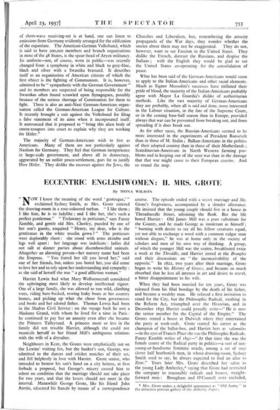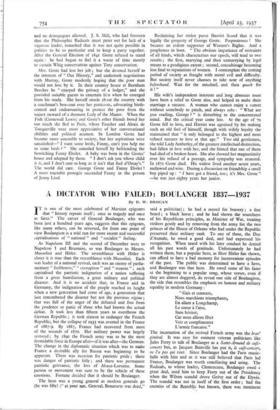ECCENTRIC ENGLISHWOMEN : H. MRS. GROTE
By MONA WILSON
OW I know the meaning of the word ' grotesque,' " exclaimed Sydney Smith, as Mrs. Grote entered the drawing-room in a rose-coloured turban. " I like them ; I like him, he is so ladylike ; and I like her, she's such a perfect gentleman." " Trelawney in petticoats," says Fanny Kemble, and gentle old Mrs. Chorley, puzzled by one of her son's guests, enquired " Henry, my dear, who is the gentleman in the white muslin gown ? " The petticoats were deplorably short : she stood with arms akimbo and legs well apart : her language was indelicate : ladies did not talk at dinner parties about disembowelled animals. Altogether an alarming person—her nursery name had been the Empress. " You feared her till you loved her," said one of her friends, but, unless you bored her, you did come to love her and to rely upon her understanding and sympathy : as she said of herself she was " a good affliction woman."
Harriet Lewin had what Mary Wollstonecraft considered the upbringing most likely to develop intellectual vigour. One of a large family, she was allowed to run wild, climbing trees, riding bare-backed, rowing leaky boats at her country homes, and picking up what she chose from governesses and books and her adored father. Thomas Lewin had been in the Madras Civil Service : on the voyage back he met a Madame Grand, with whom he lived for a time in Paris : he continued to pay her an annuity even after she became the Princess Talleyrand. A princess more or less in the family did not trouble Harriet, although she could not reconcile herself to her friend Mill's ambiguous relations with the wife of a drysalter.
Neighbours in Kent, the Grotes were emphatically not on the Lewins' visiting list, but the banker's son, George, was admitted to the dances and cricket matches of their set, and fell helplessly in love with Harriet. Grote senior, who intended to bestow his son's hand on a city heiress, at first forbade a proposal, but George's misery caused him to relent on condition that the marriage should not take place for two years, and that the lovers should not meet in the interval. Meanwhile George Grote, like his friend John Austin, educated his fiancee by means of a correspondence course. The episode ended with a secret marriage and Mr. Grote's forgiveness, accompanied by a slender allowance. He insisted that the young couple should live in a house in Threadneedle Street, adjoining the Bank. But the life bored Harriet : Old James Mill was a poor substitute for the County, and he made George as intolerant as himself ; " burning with desire to see all his fellow creatures equal, yet not able to exchange a word with a common vulgar man without disgust," he was at home only in the society of scholars and men of his own way of thinking. A group, of which the younger Mill was the centre, breakfasted twice a week at the Threddle, and Harriet jeered at the Brangles and their discussions on " the inconceivability of the opposite." In 1822, two years after their marriage, Grote began to write his History of Greece, and became so much absorbed that he lost all interest in art and desire to travel, a bitter disappointment to his wife.
When they had been married for ten years, Grote was released from his filial bondage by the death of his father, and became a wealthy man. He refused a first invitation to stand for the City, but the Philosophic Radical, exulting in the Reform Act, triumphed over the Historian, and in December 1832 Harriet could proudly write—" He is now the senior member for the Capital of the Empire." The Grotes rented a house at Dulwich where they entertained the party at week-ends. Grote started his career as the champion of the ballot-box, and Harriet hers as salonniere —in the eyes of Francis Place she was the Philosophic Radicals. Fanny Kemble writes of 1841—" At that time she was the female centre of the Radical party in politics—a sort of not- young-of-handsome feminine oracle, among a set of very clever half heathenish men, in whose drawing-room, Sydney Smith used to say, he always expected to find an altar to Zeus." Years later Mrs. Grote described her salon to the young Lady Amberley,* saying that Grote had restricted the company to reasonable radicals and honest, straight- forward men : Brougham and O'Connell were excluded, * Mrs. Grote makes a delightful appearance as " Old Aunty " in the attractive portrait gallery of the elmberley Papers. and no demagogues allowed. J. S. Mill, who had foreseen that the Philosophic Radicals must peter out for lack of a vigorous leader, remarked that it was not quite possible in politics to be so particular and to keep a party together. After the General Election of 1841 Grote refused to stand again : he had begun to feel it a waste of time merely to sustain Whig conservatism against Tory conservatism.
Mrs. Grote had lost her job ; but she devoted herself to the interests of " Our History," and undertook negotiations with Murray, Grote modestly hoping that the poor man would not lose by it. In their country house at Burnham Beeches he " enjoyed the privacy of a lodger," and she provided suitable guests to entertain him when he emerged from his study. She herself strode ab3ut the country with a coachman's box-coat over her petticoats, advocating birth- control and endeavouring to protect the poor from the unjust steward of a dormant Lady of the Manor. When the Fish (Cornwall Lewis) and Grote's other friends bored her too much she fled to Paris, where Faucher and Alexis de Tocqueville were more appreciative of her conversational abilities and political acumen. In London Grote had become more amenable to society, but her aspirations were unsatisfied—" I want some lords, Fanny, can't you help me to some lords ? " She consoled herself by befriending the bewitching Fanny Elssler. A baby was born in the Grotes' house and adopted by them. " I don't ask you whose child it is, and I don't care so long as it isn't that fool d'Orsay's." The world did care. George Grote and Fanny Elsslei! A more tractable protegee succeeded Fanny in the person of Jenny Lind. Reclaiming her- stolen purse Harriet found that it was legally the property of George Grote. Preposterous ! She became an ardent supporter of Women's Rights. And a prophetess to boot. " The obvious impatience of restraints of all kinds, which characterises our epoch, will tend to two results ; the first, marrying and then unmarrying by legal means to a prodigious extent ; second, concubinage becoming less fatal to reputations of women. I contemplate the coming period of society as fraught with moral evil and difficulty. But society itself never chooses to take note of anything beforehand. Wait for the mischief, and then quack for it ! ,, His wife's independent interests and long absences must have been a relief to Grote also, and helped to make their marriage a success. A woman who cannot enjoy a sunset without somebody to pinch, and always asks : " What are you reading, George ? " is disturbing to the concentrated mind. But the critical year came late. At the age of 70 Grote fell in love, and Harriet was agonised by his making such an old fool of himself, though with wifely loyalty she maintained that " it only belonged to the highest and most refined natures to love at that age." Two old gentlemen, she told Lady Amberley, of the greatest intellectual distinction, had fallen in love with her, and she hinted that one of them had died of a broken heart. She also showed her magnanimity over his refusal of a peerage, and sympathy was restored. In 1871 Grote died. His widow lived another seven years, mellowed and wise. During a discussion on friendship a small boy piped up : " I have got a friend, too ; it's Mrs. Grote ". —he was just eighty years her junior.











































 Previous page
Previous page